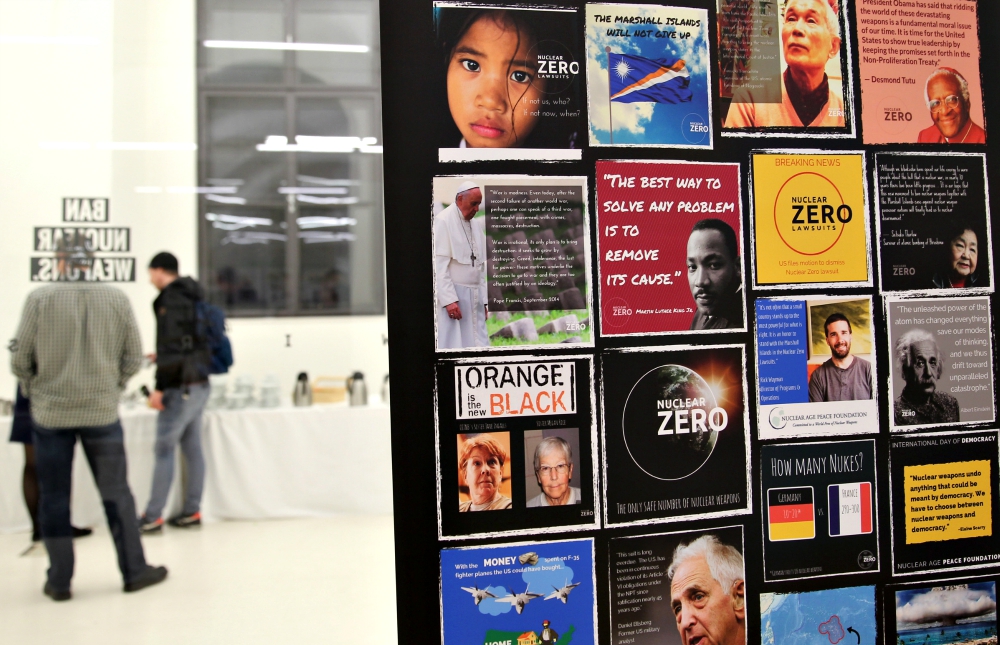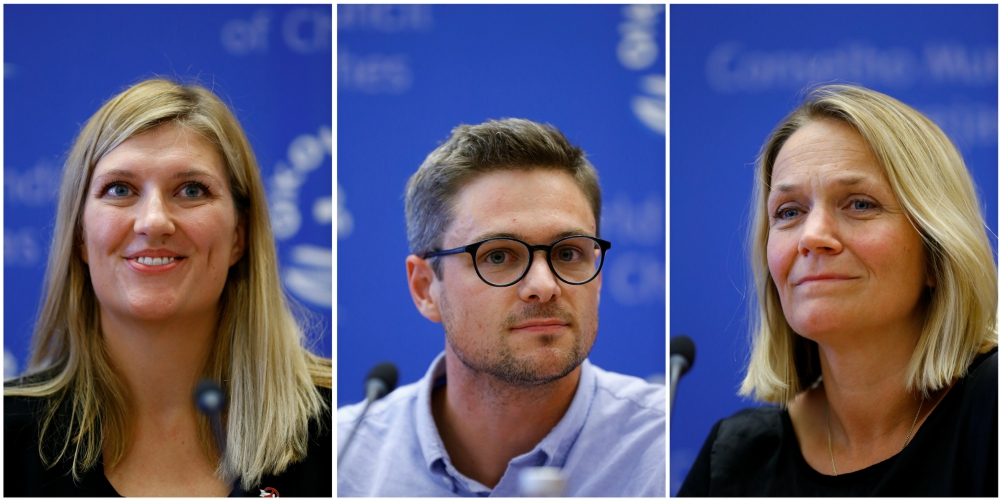
Participants talk at the International Campaign to Abolish Nuclear Weapons' Civil Society Forum in Vienna in December 2014. An image of Pope Francis was placed on a board with other leaders linked with peaceful movements. (CNS/Chaz Muth)
The Norwegian Nobel Committee has announced that the 2017 Nobel Peace Prize will be awarded to the International Campaign to Abolish Nuclear Weapons "for its work to draw attention to the catastrophic humanitarian consequences of any use of nuclear weapons and for its ground-breaking efforts to achieve a treaty-based prohibition of such weapons," according to an Oct. 6 press release by the prize committee.
The International Campaign to Abolish Nuclear Weapons is a Geneva-based coalition of hundreds of nongovernmental organizations from about 100 countries working to bring about nuclear disarmament.
This is the 98th Peace Prize awarded by the Norwegian Nobel Committee since its inaugural year of 1901. The official awarding of the prize takes place Dec. 10, the anniversary of Alfred Nobel's death, in Oslo, Norway.
The committee calls the organization "the leading civil society actor in the endeavor to achieve a prohibition of nuclear weapons under international law," citing its role in helping bring about the Treaty on the Prohibition of Nuclear Weapons at the United Nations.

A combination photo shows members of the International Campaign to Abolish Nuclear Weapons in Geneva Oct. 6. From left: Beatrice Fihn, executive director; Daniel Hogsta, coordinator; and Grethe Ostern, a member of the organization's steering committee. (CNS/Reuters/Denis Balibouse)
"It is a great honor to have been awarded the Nobel Peace Prize for 2017 in recognition of our role in achieving the Treaty on the Prohibition of Nuclear Weapons," International Campaign to Abolish Nuclear Weapons said in a statement on its website.
"This is a time of great global tension, when fiery rhetoric could all too easily lead us, inexorably, to unspeakable horror," the organization added. "The spectre of nuclear conflict looms large once more. If ever there were a moment for nations to declare their unequivocal opposition to nuclear weapons, that moment is now."
Maryknoll Sr. Jean Fallon, 87, a longtime anti-nuclear activist, told NCR she was "thrilled" by the news, calling it a victory for all of those who have been active in movements to eliminate nuclear weapons, culminating in the United Nations action earlier this year. "This is for everybody," she said. "We've had so many people involved with this issue for years."
"It's a huge thing," she said.
"It's providential," said Sr. Stacy Hanrahan, who represents the Congregation of Notre Dame at the United Nations and has long been involved in U.N.-based nuclear disarmament efforts. "It's such a propitious time, what has been happening at the United Nations."
Hanrahan said the fact that a nongovernmental organization won the award was both an acknowledgement of the strength of grassroots efforts and a tribute to those "who have been working on it [the nuclear issue] for years."
She added that the recent war of rhetoric between the governments of the United States and North Korea is frightening but has refocused attention on the real possibility of nuclear war. "It has gotten everybody's attention. It's serious. This [nuclear war] could happen, and put us in a place where no one wants to be," she said.
Longtime anti-nuclear activist Dominican Sr. Carol Gilbert, along with fellow activist and Dominican Sr. Ardeth Platte, was in Colorado Oct. 6 on a campaign to raise public awareness about the U.N. treaty. In addition to making appearance at schools and churches, the two Dominicans were hoping to deliver copies of the treaty to the actual silos where nuclear warheads are housed.
The sisters' campaign had been planned well before today's Nobel announcement, but Gilbert said it was a "beautiful" coincidence that reinforces their efforts.
"We're very happy — actually, thrilled," said Gilbert.
Jesuit Fr. Drew Christiansen, senior research fellow at Georgetown University's Berkley Center for Religion, Peace and World Affairs, says that International Campaign to Abolish Nuclear Weapons' success demonstrates the effect nongovernmental organizations can have when given an opportunity to work inside the U.N.
"You'll probably see more of these kinds of alliances between civil society and states at the U.N. in the future," he told NCR.
Advertisement
The Treaty on the Prohibition of Nuclear Weapons would stop countries from "undertaking to develop, test, produce, manufacture, acquire, possess or stockpile nuclear weapons or other nuclear explosive devices, as well as the use or threat of use of these weapons," according to a U.N. press release. If it gains the signature and ratification of 50 states, it would become the first legally binding treaty prohibiting nuclear weapons.
In July, 122 countries of the U.N. voted in favor of the final draft of the treaty, and dozens signed Sept. 20 when it opened for signature. To date, 53 countries have signed the treaty, three of whom have already ratified it.
The Holy See is among the states that have signed and ratified the treaty. Pope Francis has long been a proponent of nuclear disarmament, telling the U.N. that there is "urgent need to work for a world free of nuclear weapons" during his visit to the United States in 2015.
When the final draft was announced, France, the United Kingdom and the United States said in a press release that they "do not intend to sign, ratify or ever become party to [the treaty]. Therefore, there will be no change in the legal obligations on our countries with respect to nuclear weapons. ... This initiative clearly disregards the realities of the international security environment. Accession to the ban treaty is incompatible with the policy of nuclear deterrence, which has been essential to keeping the peace in Europe and North Asia for over 70 years."
[James Dearie is an NCR Bertelsen intern. Contact him at jdearie@ncronline.org. Chris Herlinger, international correspondent for Global Sisters Report, contributed to this report.]





